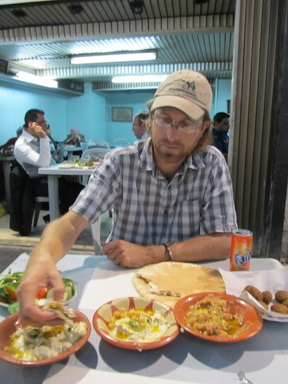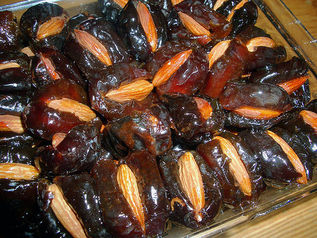 Mike digs into a bowl of hummus at Hashem in Jordan. "Welcome to Jordan," shopkeepers, waiters, perfume sellers, and taxi drivers called out as we walked down the streets of the capital, Amman, on our first evening in the country. If we stopped to say "Shukran!" ("Thank you" in Arabic), we might get the follow-up questions "First time Jordan? Where you from?" When we said we are from the U.S., we were always welcomed again. "America good," with a thumbs up. This is probably not the reception most Americans expect from a Muslim country bordered by Iraq, Syria, Saudi Arabia, Israel, and Palestine. But Jordanians are renowned for their hospitality. Many of the residents are of Bedouin descent. A traditionally nomadic ethnic group, the Bedouin have long endured life in a bitterly dry and hot landscape, in part through their honor code of diyafa. Every traveler, even an enemy, must be offered shelter, food, and protection if she or he approaches a Bedouin tent in the desert. In the modern city of Amman, diyafa showed up in a handful of salted melon seeds our taxi driver passed back to us without a word. On our walk to dinner, a vendor gave us a free taste of a freshly cracked almond--he broke the shell with his hands--and a dried fig covered in powdered sugar. At the outdoor eatery Hashem (where I had the most creamy, garlicky, spicy, delicious hummus of my life), the table next door passed over a falafel ball stuff with onions and peppers. They hardly paid attention as we ate it, as though we were already members of their family. The waiter, Said, wearing a muscle T-shirt and a big toothy smile, shook my hand. "Welcome to Jordan," he said.
11 Comments
 Photo of almond-stuffed dates courtesy of Alexander Becker. At the airport in Casablanca, Morocco, I saw a family, mostly women and children, waiting outside the baggage claim area. The women were covered in the traditional jelaba (loose hooded caftans) and headscarves in royal blue, lavender, and rose. Beside one of the women sat a tray with two delicate tea cups and saucers printed with flowers. There was also a decanter of what looked like milk and a plate of fruit wrapped in plastic and tied with a ribbon. As the group waited, one of the older women rearranged the cups and stuffed them with white paper napkins that she carefully puffed up like petals. A white-haired and -bearded man wearing a jelaba and Muslim kufi cap walked past customs and through the door. The women rushed toward him in a wave and made a celebratory ululation, a call that sounds a bit like the trilling ring of a high-pitched phone. Suddenly there were kisses all around, one for each cheek. The women started singing a song together. All this happened before the man had even fully exited the gate into the terminal. Out came the china cups, and the plate was unwrapped—the careful arrangement undone so quickly. The woman with her head covered in the royal blue scarf offered the treats on the plate to the whole family. Then to my surprise, she and a younger man walked around to all the strangers in the surrounding waiting area, including me, and offered what I could now see were plump dates. Mine was stuffed with large almonds. It was caramely and crunchy. In French, I asked the woman what this occasion was all about. She said that her father had just returned from Mecca (a trip there is one of the five tenants of Islam, but only if the family can afford it). The young man asked, “C’est bon?” about the date. “Oui! Oui! Merci!” I said. What I did not say is that as I ate it, I felt that I had been made part of their celebration and even their family in a small, sweet way. Later that afternoon, I could still feel that family's joy filling my stomach with warmth. |
Archives
July 2012
Categories
All
|
 RSS Feed
RSS Feed